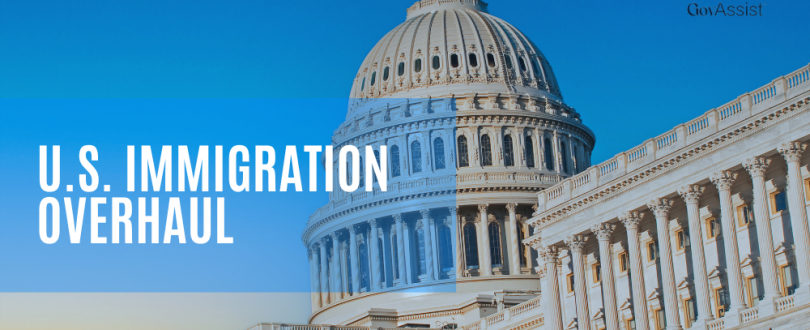
In the ever-evolving landscape of U.S. immigration policy, the proposed bill from the Biden Administration signals a pivotal change. As travelers, it’s crucial to understand these developments, whether you’re visiting, studying, or planning to work in the States. This blog dissects the bill’s key components, offering essential insights into potential changes in U.S. immigration.
Background of U.S. Immigration Policy
The United States has long been a mosaic of diverse cultures, largely shaped by its history as a nation of immigrants. From the early 19th century, immigrants have been instrumental in shaping the country’s demographic, economic, and cultural identities. U.S. immigration policy has evolved significantly, often mirroring the political and social climates of various eras.
The landmark 1965 Immigration and Nationality Act, which abolished the national origins quota, stands as a notable example, opening the country to immigrants from diverse backgrounds. However, the existing system has faced criticism for its complexity, protracted visa wait times, and sometimes stringent enforcement measures. Understanding this historical context is vital for appreciating the significance of the proposed immigration overhaul.
Overview of the Proposed Immigration Bill
The Biden Administration’s bill aims to fundamentally transform the current immigration system. It ambitiously addresses various issues, from streamlining legal immigration processes to offering a pathway to citizenship for undocumented immigrants.
Additionally, it focuses on enhancing border management and ensuring the humane treatment of migrants. This bill represents a significant shift in policy, potentially reshaping U.S. immigration for years to come.

Pathway to Citizenship
A cornerstone of the bill is establishing a more direct pathway to citizenship, particularly for the millions of undocumented immigrants in the U.S. This plan includes an eight-year route to permanent residency and eventual citizenship, based on specific criteria.
Notably, provisions for ‘Dreamers’—those brought to the U.S. as children—suggest a faster track to citizenship. This approach marks a considerable shift towards a more inclusive immigration policy, acknowledging the longstanding contributions of immigrants to American society.
Border Security and Enforcement
The proposed bill seeks a balance between enhancing border security and addressing humanitarian concerns. It advocates for smarter border controls, utilizing technology and infrastructure improvements over purely physical barriers.
The bill also targets the root causes of migration from Central America, focusing on international cooperation and development aid. For travelers, this suggests a more efficient and equitable border-crossing experience, potentially reducing bottlenecks and streamlining entry into the U.S.
Asylum and Refugee Policies
In a significant shift from recent policies, the proposed bill aims to broaden opportunities for refugees and asylum seekers. This includes measures to clear the backlog of asylum cases and an increase in the annual refugee cap.
The bill also proposes to streamline the asylum application process, making it more accessible and less time-consuming. These changes reflect a commitment to international humanitarian standards and providing refuge to those fleeing persecution and violence.
Visa System and Legal Immigration Channels
The proposed overhaul includes major changes to the visa framework, aiming to make legal immigration more accessible and efficient. Key proposals include revising the caps on employment-based visas, which could significantly impact skilled professionals worldwide. The bill also focuses on expediting family reunification processes and increasing diversity visa availability, reflecting a commitment to preserving the U.S. as a cultural melting pot.
These changes are designed to attract talent, support family unity, and enrich American society with diverse perspectives, all while maintaining a robust and fair immigration system.
Immigration Detention and Enforcement
The bill critically examines immigration detention and enforcement practices, emphasizing humane treatment and legal fairness. It proposes limiting detention use, favoring community-based enforcement programs, and improving conditions for detainees. The bill underscores the need for due process and legal representation in immigration proceedings, potentially altering the experiences of those navigating the enforcement system.
This shift reflects an understanding of migration’s complexities and a commitment to upholding human rights within the immigration process.
Addressing Immigration Court Backlogs
A significant challenge in the U.S. immigration system is the backlog in immigration courts. This backlog causes extended wait times for hearings, affecting individuals’ lives and the system’s efficiency. The bill addresses this by increasing the number of immigration judges and court staff, aiming to expedite cases and reduce the backlog.
It also proposes leveraging technology to enhance court processes. These changes are vital for a more responsive and effective immigration system, ensuring timely justice and resolution for applicants.
Integration and Support Services
The bill includes provisions for enhanced integration and support services for new immigrants. This encompasses access to English language education, workforce development programs, and legal assistance.
By investing in these services, the bill acknowledges the importance of helping immigrants fully participate in and contribute to American society. These initiatives are crucial for ensuring that immigrants not only arrive in the U.S. but also thrive and become active, engaged members of their communities.
Addressing Human Trafficking and Exploitation
With human trafficking and exploitation remaining significant global concerns, the proposed bill takes a firm stance against these issues. It strengthens protections for vulnerable populations, including harsher penalties for traffickers and increased support for victims. The bill also aims to enhance international cooperation to dismantle trafficking networks. These measures demonstrate a commitment to protecting individual dignity and safety, both at U.S. borders and within the country, highlighting the role of immigration policy in combating global issues like human trafficking.
The Biden Administration’s immigration bill could significantly transform U.S. immigration policy, potentially making the U.S. a more accessible and welcoming destination for travelers worldwide. As these changes unfold, staying informed and prepared is key.
For those navigating the complexities of U.S. visa applications, GovAssist offers invaluable assistance. Their expertise can smooth the application process, ensuring compliance with the latest regulations and maximizing the chances of a successful application. Whether traveling for leisure, work, or family, GovAssist can be a trusted partner in your U.S. immigration journey.
Stay tuned as we continue to provide the latest information and guidance in this dynamic immigration landscape. Happy travels!

